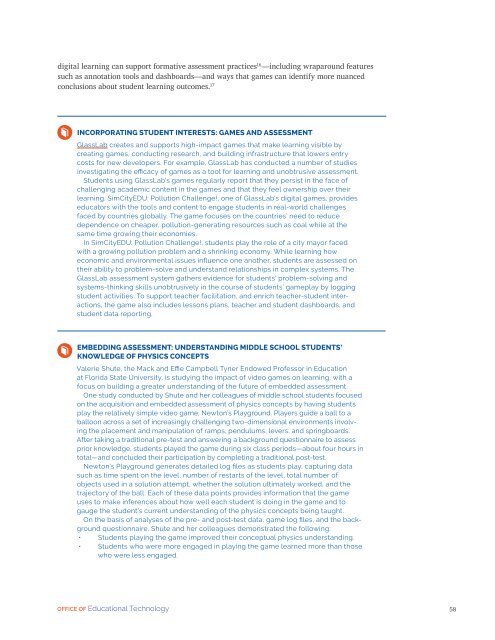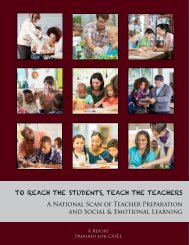Future Ready Learning
7m3sdJ
7m3sdJ
You also want an ePaper? Increase the reach of your titles
YUMPU automatically turns print PDFs into web optimized ePapers that Google loves.
digital learning can support formative assessment practices 16 —including wraparound features<br />
such as annotation tools and dashboards—and ways that games can identify more nuanced<br />
conclusions about student learning outcomes. 17<br />
INCORPORATING STUDENT INTERESTS: GAMES AND ASSESSMENT<br />
GlassLab creates and supports high-impact games that make learning visible by<br />
creating games, conducting research, and building infrastructure that lowers entry<br />
costs for new developers. For example, GlassLab has conducted a number of studies<br />
investigating the efficacy of games as a tool for learning and unobtrusive assessment.<br />
Students using GlassLab’s games regularly report that they persist in the face of<br />
challenging academic content in the games and that they feel ownership over their<br />
learning. SimCityEDU: Pollution Challenge!, one of GlassLab’s digital games, provides<br />
educators with the tools and content to engage students in real-world challenges<br />
faced by countries globally. The game focuses on the countries’ need to reduce<br />
dependence on cheaper, pollution-generating resources such as coal while at the<br />
same time growing their economies.<br />
In SimCityEDU: Pollution Challenge!, students play the role of a city mayor faced<br />
with a growing pollution problem and a shrinking economy. While learning how<br />
economic and environmental issues influence one another, students are assessed on<br />
their ability to problem-solve and understand relationships in complex systems. The<br />
GlassLab assessment system gathers evidence for students’ problem-solving and<br />
systems-thinking skills unobtrusively in the course of students’ gameplay by logging<br />
student activities. To support teacher facilitation, and enrich teacher-student interactions,<br />
the game also includes lessons plans, teacher and student dashboards, and<br />
student data reporting.<br />
EMBEDDING ASSESSMENT: UNDERSTANDING MIDDLE SCHOOL STUDENTS’<br />
KNOWLEDGE OF PHYSICS CONCEPTS<br />
Valerie Shute, the Mack and Effie Campbell Tyner Endowed Professor in Education<br />
at Florida State University, is studying the impact of video games on learning, with a<br />
focus on building a greater understanding of the future of embedded assessment.<br />
One study conducted by Shute and her colleagues of middle school students focused<br />
on the acquisition and embedded assessment of physics concepts by having students<br />
play the relatively simple video game, Newton’s Playground. Players guide a ball to a<br />
balloon across a set of increasingly challenging two-dimensional environments involving<br />
the placement and manipulation of ramps, pendulums, levers, and springboards.<br />
After taking a traditional pre-test and answering a background questionnaire to assess<br />
prior knowledge, students played the game during six class periods—about four hours in<br />
total—and concluded their participation by completing a traditional post-test.<br />
Newton’s Playground generates detailed log files as students play, capturing data<br />
such as time spent on the level, number of restarts of the level, total number of<br />
objects used in a solution attempt, whether the solution ultimately worked, and the<br />
trajectory of the ball. Each of these data points provides information that the game<br />
uses to make inferences about how well each student is doing in the game and to<br />
gauge the student’s current understanding of the physics concepts being taught.<br />
On the basis of analyses of the pre- and post-test data, game log files, and the background<br />
questionnaire, Shute and her colleagues demonstrated the following:<br />
• Students playing the game improved their conceptual physics understanding.<br />
• Students who were more engaged in playing the game learned more than those<br />
who were less engaged.<br />
OFFICE OF Educational Technology<br />
58



